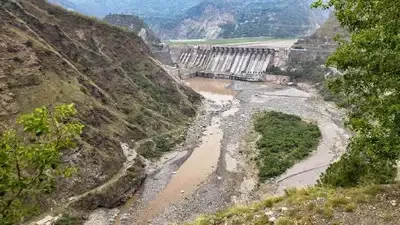Latest Updates
Pakistan Faces Grim Kharif Season amid Reduced Water Flow from India

Pakistan is staring at a dismal kharif (summer crops) sowing season due to alarmingly low water levels in its key reservoirs, Mangla on the Jhelum and Tarbela on the Indus. The situation has worsened with a "sudden decrease" in inflows from the Chenab, reportedly caused by India regulating water flow following the recent Pahalgam terror attack.
The crisis may deepen this month as early kharif sowing begins. In what appears to be a response, Pakistan Prime Minister Shehbaz Sharif flagged the issue at a glacier preservation conference in Dushanbe, Tajikistan, last week, drawing global attention to India’s suspension of the Indus Waters Treaty (IWT).
According to the Indus River System Authority (IRSA), Pakistan is already grappling with a 21% shortfall in water availability. Live storage in the Mangla and Tarbela dams is at nearly half capacity critical for irrigation in Punjab and Sindh, and for hydropower generation.
IRSA expressed concern over India’s “short supply” from the Chenab at Marala, warning it would further worsen water shortages during the early sowing phase. The authority has urged reservoir managers and irrigation agencies to use water judiciously.
Although monsoon rains in July could bring relief, Pakistan's farming fortunes now largely hinge on how India manages its own limited infrastructure on the Chenab, namely the Baglihar and Salal dams in Jammu and Kashmir.
So far, India has only flushed sediment from these reservoirs to increase capacity and has reportedly withheld water flow data from Pakistan since suspending the 1960 treaty following the Pahalgam massacre.
Officials in New Delhi argue that with the IWT suspended, India is no longer obliged to share real-time water data, posing a challenge for Pakistan during flood season, especially since large parts of the Indus river system originate in India.
Punjab and Sindh’s agriculture is almost entirely dependent on the Indus system, fed by the western rivers, Indus, Jhelum, and Chenab.
While India holds full rights over eastern rivers (Ravi, Sutlej, and Beas), its limited infrastructure to harness these waters has inadvertently benefited Pakistan. Though India is permitted to store up to 3.6 MAF on western rivers under IWT, it has not fully utilized this capacity, making Pakistan a beneficiary by default.






.webp)


